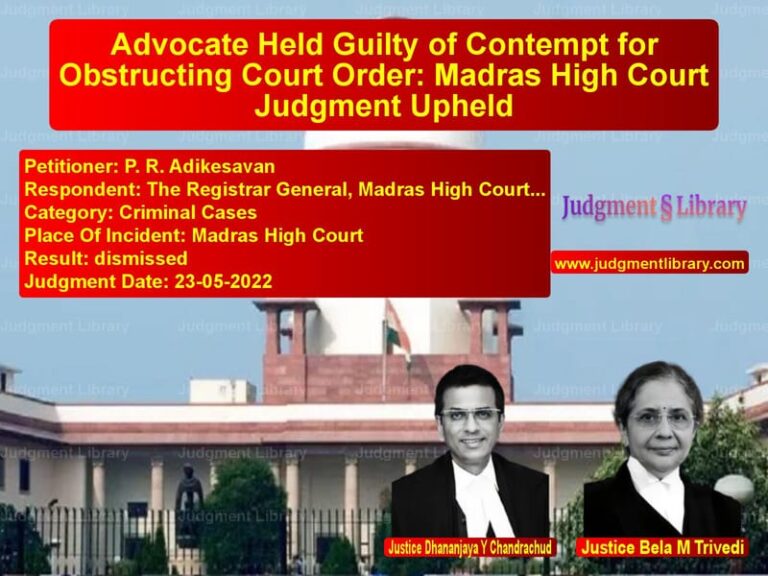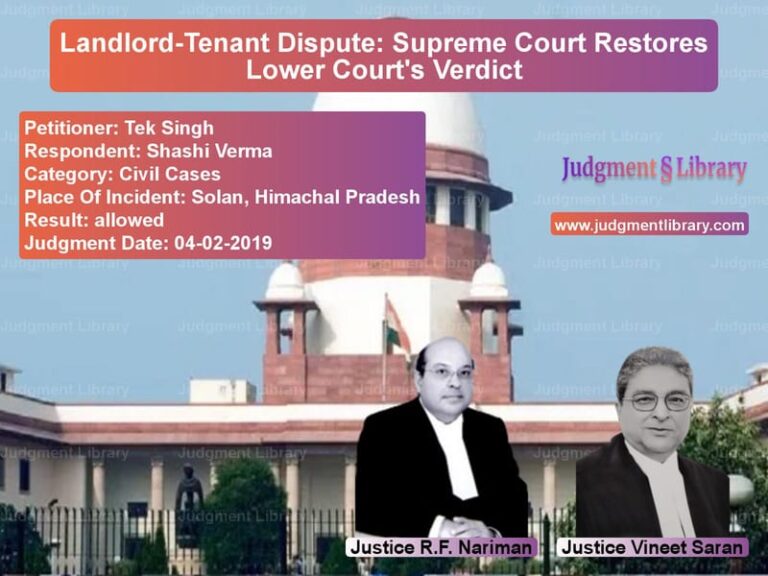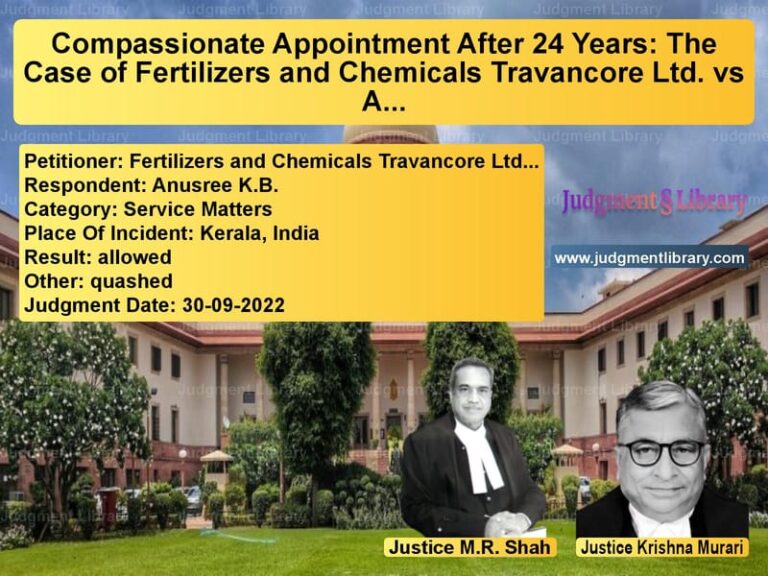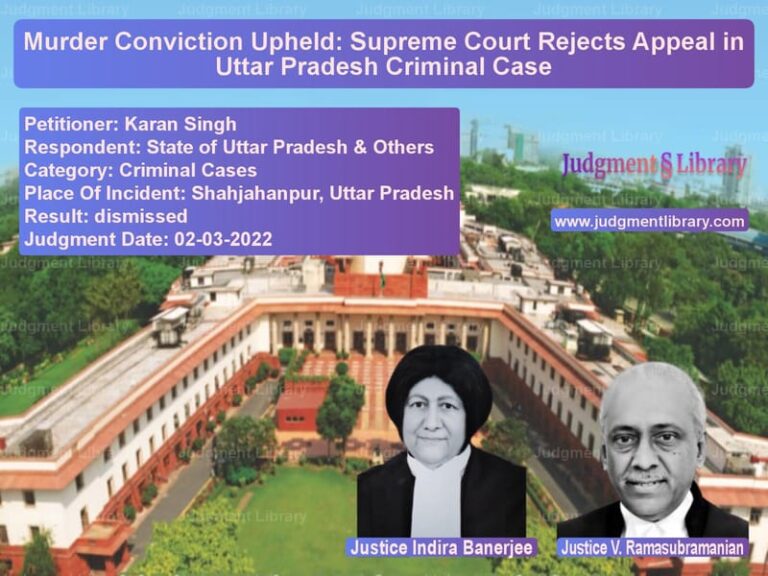Supreme Court Quashes Defamation Case Against Tejashwi Yadav Over ‘Gujarati Thug’ Remark
The Supreme Court, in Tejashwi Prasad Yadav v. Hareshbhai Pranshankar Mehta, quashed the defamation case filed against the petitioner, ruling that his public statements had been unconditionally withdrawn and no purpose would be served by continuing the prosecution. The decision underscores the Court’s authority under Article 142 of the Constitution to ensure complete justice.
Background of the Case
The case originated from a defamation complaint filed against Tejashwi Prasad Yadav in the Court of the Additional Chief Metropolitan Magistrate, Ahmedabad. The complaint was based on a statement made by the petitioner on March 22, 2023, which was widely reported in electronic and print media. The complainant alleged that the petitioner defamed the entire Gujarati community by making the following statement:
“Jo bhi do thug hai na, jo thug hai, thug ko anumati jo hai, aaj ke desh ke condition me dekha jaye then only Gujarati hi thug ho sakte hai, aur uske thug ko maaf kiya jayega. LIC ko paisa do, bank ko paisa do, fir wo log le ke bhag jayenge, to kaun jimmedaar hoga?”
The respondent, Hareshbhai Pranshankar Mehta, claimed that this statement generalized all Gujaratis as ‘thugs’ and led to reputational damage for the community. The complaint also relied on a YouTube video where the statement appeared.
Key Legal Issues
- Whether the statement made by the petitioner constituted defamation under Section 499 of the IPC.
- Whether withdrawing the statement could serve as grounds for quashing the criminal complaint.
- Whether Article 142 of the Constitution could be invoked to ensure complete justice in the case.
Petitioner’s (Tejashwi Yadav’s) Arguments
- The statement was made in the context of a question regarding Mehul Choksi and was not intended to defame any community.
- He unconditionally withdrew the statement in an affidavit dated January 18, 2024, and reaffirmed this in another affidavit dated January 31, 2024.
- He expressed deep respect for the Gujarati community and stated that his words were misconstrued.
- Since he had withdrawn his statement and clarified its intent, continuing the prosecution was unnecessary.
Respondent’s (Hareshbhai Mehta’s) Arguments
- The statement had already caused harm to the reputation of Gujaratis.
- The withdrawal of the statement did not negate its past impact.
- The prosecution should proceed as per law, regardless of the withdrawal.
Supreme Court’s Observations
The Bench, comprising Justices Abhay S. Oka and Ujjal Bhuyan, made key observations:
- “Not only has the petitioner withdrawn the offending statements, but he has also stated that he never intended to defame Gujaratis as a community.”
- “The petitioner has clarified that he holds Gujaratis in great esteem and has no ill will or animus against them.”
- “Under Article 142 of the Constitution, this Court has the power to pass orders necessary to ensure complete justice between the parties.”
- “Since the petitioner has explained the context of his remarks and withdrawn them, continuing the prosecution serves no useful purpose.”
Key Legal Findings
- The petitioner unconditionally withdrew the offending statement.
- The Court has extraordinary jurisdiction under Article 142 to quash proceedings in the interest of justice.
- Continuing the prosecution after withdrawal and clarification of the remarks was unjustified.
- The prosecution was quashed to prevent unnecessary litigation.
Final Judgment
The Supreme Court ruled:
“The criminal case bearing no. CC/83849/2023 arising out of case no. CR/EN/7110/2023, titled Hareshbhai Pranshankar Mehta v. Tejashwi Lalu Prasad Yadav, pending before the Additional Chief Metropolitan Magistrate, Ahmedabad, is quashed. The petition is disposed of accordingly.”
Key Takeaways from the Judgment
- Public figures must exercise caution in making statements that can be perceived as defamatory.
- Unconditional withdrawal of a defamatory statement can serve as grounds for quashing a defamation case.
- The Supreme Court can invoke Article 142 to ensure justice and prevent unnecessary litigation.
- Merely filing a defamation complaint does not automatically entitle a complainant to continue prosecution when circumstances change.
Impact of the Judgment
This ruling sets a precedent for handling defamation cases involving political speeches. It ensures that:
- Defamation laws are not misused for political vendettas.
- Withdrawal of an allegedly defamatory statement can be considered a mitigating factor.
- Courts must weigh the necessity of continuing prosecution when the alleged harm has been undone.
- Freedom of speech remains protected while balancing reputational harm claims.
Conclusion
The Supreme Court’s decision in Tejashwi Prasad Yadav v. Hareshbhai Pranshankar Mehta underscores the importance of responsible speech and the role of judicial intervention in defamation cases. By quashing the proceedings after the petitioner withdrew his statement, the Court reinforced the principle that criminal defamation should not be pursued unnecessarily when the alleged harm has been undone. This ruling will serve as an important precedent for similar cases in the future.
Petitioner Name: Tejashwi Prasad Yadav.Respondent Name: Hareshbhai Pranshankar Mehta.Judgment By: Justice Abhay S. Oka, Justice Ujjal Bhuyan.Place Of Incident: Ahmedabad, Gujarat.Judgment Date: 13-02-2024.
Don’t miss out on the full details! Download the complete judgment in PDF format below and gain valuable insights instantly!
Download Judgment: tejashwi-prasad-yada-vs-hareshbhai-pranshank-supreme-court-of-india-judgment-dated-13-02-2024.pdf
Directly Download Judgment: Directly download this Judgment
See all petitions in Criminal Defamation
See all petitions in Judgment by Abhay S. Oka
See all petitions in Judgment by Ujjal Bhuyan
See all petitions in allowed
See all petitions in Quashed
See all petitions in supreme court of India judgments February 2024
See all petitions in 2024 judgments
See all posts in Defamation Cases Category
See all allowed petitions in Defamation Cases Category
See all Dismissed petitions in Defamation Cases Category
See all partially allowed petitions in Defamation Cases Category







